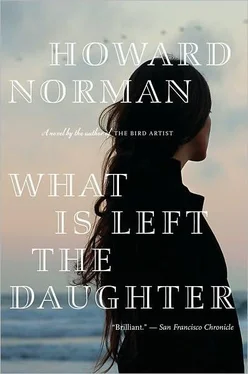There was rain and more rain, and it was dark all afternoon, more a deepening of the morning's darkness, really. It felt like the Minas Basin had gotten an early start on summer storms, impatient for the turbulence. I put a pot of tea on to boil and listened to many gramophone records in a row. In prison, this was something I daydreamed of doing, and one time asked a guard, Mr. DeForge, "Who do you like more, Beethoven, Chopin or Vivaldi?"
"I'll personally drag you out of that cell and stuff you up your own asshole," he said, "you ever ask me that kind of question again."
I'd just put on Beethoven's Sonata in F Major when the telephone rang in the kitchen. I looked at the clock: 1:20 A.M. I picked up the receiver and said hello, and Tilda said, "Wyatt, there's two crows somehow got into the library. They're in the library right now. Listen—"
She apparently held the telephone receiver in midair, because I heard a definite cawwwrrrruuup loud and clear. "Hear that?" she said. "I can't read with this going on. I can't concentrate. I'm going crazy. A drawer in the card catalogue was left open a crack, and a crow plucked a whole bunch of cards right out. The other crow watched from Mrs. Oleander's desk."
"Tilda, are you asking me to drive over?"
"I've told you about these crows — do what you want."
I got to the library in maybe ten minutes. Lightning over the Minas Basin. Opening the library's front door, I heard a crow's weird voice. I left the door open. By the light of a floor lamp next to the overstuffed chair, plus shadow-flickering light cast from the fireplace, I saw Tilda in stocking feet in the corner, dressed in dungarees, a pale blue shirt and a black button-down sweater. And she was wielding a mop.
"That one crow there just shat on Mrs. Oleander's desk," she said.
"How'd they get in, do you think?"
"I'm pretty sure the wind knocked out a window upstairs. This library's got an attic, you know."
"No, I didn't know that."
I saw the file cards all over the floor. One crow was still on Mrs. Oleander's desk, silent. The other was on the long reading table, producing coughs and clicks, tearing out the page of a book, holding the cover open with its claw. I took off my shoes and threw one at this crow, who dodged the shoe and fluttered up, page in its beak, landing on Mrs. Oleander's desk. Both crows hopped about. I threw my other shoe, this time striking one crow, and both flew right at Tilda, who waved her mop, redirecting them out the front door.
Tilda slammed shut the door, then slid to the floor, laughing as hard as I'd ever known her to laugh. I threw myself onto the overstuffed chair and said, "Some life you've got now, Tilda. I see you've given up on people altogether. It's just you and books at night and crows, huh?"
"I telephoned you, didn't I? Damsel in distress and all that."
"That's never been you and never will be."
"Think what you want."
We looked at each other a moment, then Tilda said, "Before those birds flew in, you know what I was reading, maybe for the tenth time?"
"I've never read anything for the tenth time. Which book?"
" In a German Pension, by Katherine Mansfield."
"How far along were you?"
"Page four. Then all hell broke loose."
"I should leave you to your reading, then."
"Want to hear it, Wyatt?"
"Want to hear what?"
" In a German Pension. "
"The whole thing?"
"I'm ready and willing."
Tilda sat in the overstuffed chair on the right side of the fireplace. I added a few logs to the fire and brought Mrs. Oleander's chair close to the left side of the fireplace. Both chairs now faced the fire at an inward slant. When the flames steadied, we could hear rain hissing in the grate.
Tilda opened the book and said, "The first story's called 'Germans at Meat.' Once I start reading, don't interrupt me, Wyatt. I never interrupt myself when I'm reading alone, and I prefer it that way."
"I always wanted to be read to."
"Then this is your big moment."
She moved the floor lamp closer, settled back into the chair and began to read: "Bread soup was placed upon the table. 'Ah,' said the Herr Rat, leaning upon the table as he peered into the tureen, 'that is what I need.'"
Why do I still remember those sentences, Marlais? For the next three hours — at least that long — Tilda read story after story. Besides "Germans at Meat," I remember the titles of two others, "The Child-who-was-tired" and "The Sister of the Baroness," but I think there were thirteen in all.
She read each one with the same dedication.
"Well, that's that, then," Tilda said when she'd finished. "I see you're still awake, Wyatt." She set the book down on the hassock. A silence fell between us, not just defined by being in a nighttime library, or noticeable because rain drumming on the roof drowned out most other sound. No, it was something else altogether. It was as if a fleeting chance was presented us by mute angels — to reference a hymn — who couldn't later report us to God even if they'd wanted to. Tilda and I seemed to have been, for a brief time, offered a secret life, sequestered, outside the scrutiny of our neighbors in Middle Economy, a safe haven from all recent ghosts. True, no dictionary definition of love might apply to what happened between us that night, but my choice is not to consult a dictionary. Whatever else, we didn't worry to near madness what was to be done with our bottled-up emotions. There we were, in a room without any history between us, a room we'd never been in together before. It took place only that once, ending with daylight, pale in the rain-streaked windows. Clothes scattered. Fingertips less numb. The desk lamp still lit.
Marlais, father-daughter decorum insists that I not describe any more. Besides, I'd be too embarrassed, even in a letter. However, I'll risk mentioning that when you were six months old, the three of us were in the kitchen, and Tilda looked across the table and said, "In the library that night, when we sat in the overstuffed chair, tucked together like we were, I knew the moment our daughter was conceived."
You were born six pounds eight ounces at Truro General Hospital, 11:58 P.M. on March 27, 1946. Cornelia Tell and I were called in from the waiting room to see you, all of half an hour old, held in your mother's arms. You were named Marlais Constance-Hillyer. Marlais, after Marlais Winterhew, the author of The Highland Book of Platitudes. Tilda chose the name.
Your mother was the love of my life. I was not the love of hers. You became the love of both of ours.
The Rooms above the Bakery
MARLAIS, AT MY KITCHEN table here at 58 Robie, I'm looking at the Monday church bulletin from Middle Economy dated October 25, 1948, and the heading reads: DANISH CITIZENS VISIT MIDDLE ECONOMY.
Marcus and Uli Mohring, now officially Danish citizens, arrived to Middle Economy by bus on Friday, October 15. Since you were about two and a half years old at the time, you probably don't — do you? — remember meeting them at the bus in Great Village. It made all the sense in the world when Tilda requested, during the few days Mr. and Mrs. Mohring set up in the house, that I keep to the shed during the day and stay in the rooms above the bakery at night. As a result, I never so much as caught a glimpse of them. Best for everyone. Naturally, their presence caused a lot of local curiosity and astonishment. It resurrected much sadness, too.
Until the magistrate's hearing took place in the library back in 1942, Donald, Constance, Tilda, Cornelia and I were the only ones who knew much about Hans. Since then, two newspaper hacks had attempted to write about the murder in Middle Economy "during the war," but nobody in the village gave them enough time, information or opinions to support a feature story. One reporter, Abigail Montrose, said in a brief article in the Mail, "The citizens of that outport generally met my inquiries with cold politeness." Now and then somebody stopped into the bakery and asked Cornelia where "the house where the murder took place" could be found. Or words to that effect.
Читать дальше












